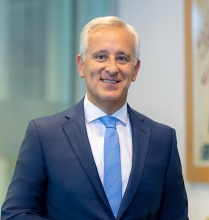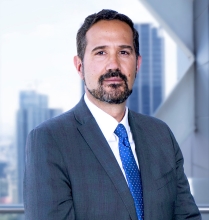International Arbitration Newsletter - November 2019 | Regional Overview: Middle East and Africa
The most relevant updates from Middle East and Africa from the global International Arbitration and ADR practice group at Garrigues.
CAMEROON
Cameroon defeats claim filed by investment vehicle linked to the Fotso family
An ad hoc committee rejected the annulment petition filed by Luxembourg registered Capital Financial Holdings Luxembourg (“CFHL”) against Cameroon over the expropriation of its shares in Commercial Bank Cameroon.
CFHL is ultimately controlled by Yves-Michel Fotso, who was convicted and handed two life sentences by a Cameroonian court for alleged embezzlement while he was acting as the director general of the country's defunct national airline, CAMAIR. His father, Victor Fotso, is a Cameroonian billionaire who in the 1980s founded the Fotso commodities group – which now operates across several West-African countries.
CFHL filed the ICSID claim in 2015 following the alleged expropriation of its shares in Commercial Bank Cameroon, which Yves-Michel Fotso founded with his father in 1997 and later managed.
The bank was placed into provisional administration by COBAC, the regional banking regulator, in 2009 - even though CFHL says it continued to be profitable. In 2013, the company's shares were attached by Cameroon's finance ministry and the bank's capital reduced to zero, which CFHL says created a loss of €105 million.
A tribunal found that CFHL did not meet the nationality requirements of the bilateral investment treaty between the Belgo-Luxembourg Economic Union and Cameroon. The BIT provides that an investor must both be constituted and have its seat, or “siège social”, in Luxembourg to qualify for its protections.
EGYPT
Egyptian Cassation Court clarifies requisites of arbitral institutions
The Egyptian Court of Cassation has set out criteria defining what qualifies as an arbitral institution and specified the criteria an entity must meet to qualify as a “permanent arbitral institution or an arbitration centre”.
In its judgment, the court ruled that an international arbitration centre in Egypt must be established and based in the country pursuant to an international or regional treaty or law, for the purpose of administering international commercial arbitration cases.
International arbitration centres based outside Egypt should be “internationally or regionally well-known” and have “gained the trust” of clients over the years in the fields of international business, trade and investment.
The court noted that in a debate held in Egyptian parliament on the Egyptian Arbitration Law, a delegate to the government referred to the ICC International Court of Arbitration as a global benchmark for arbitration institutions.
The judgment arises from a dispute over the termination of a construction contract for a glass factory in Egypt which was administered by the International Arbitration Centre (IAC). After an award in that dispute rendered in 2017, one of the parties lodged a set-aside application before the Cairo Court of Appeal. The court said that the case lacked the characteristics of international commercial arbitration, noting that the parties had agreed the dispute would be “non-institutional” and that minutes from the arbitral hearings said that the case was ad hoc.
KUWAIT
ICSID tribunal dismisses Egyptian investor’s treaty claim against Kuwait
In a recent award, an ICSID Tribunal has rejected the claim by Egyptian construction company Almasryia against Kuwait filed under the Egypt-Kuwait bilateral investment treaty in a dispute relating from a joint venture Almasryia entered into with a Kuwaiti national to build a tourism resort in the country.
The Kuwaiti national, Faisal Bandar Al-Otaibi, is understood to have claimed to own land in what was formerly part of the Saudi–Kuwaiti Neutral Zone, but Al-Otaibi’s claim to the land was not recognised by Kuwaiti authorities,.
The tribunal accepted Kuwait’s preliminary objections under ICSID rule 41(5), which allows respondents to argue a claim is “manifestly without legal merit”.
Mozambique
ICSID tribunal rejects Achmea objection of Italian builder against Mozambique
An ICSID tribunal has rejected an €8.2 million claim by Italian construction group CMC di Ravenna against Mozambique over the state’s refusal to honour an alleged settlement agreement, after dismissing the state’s objection that the Achmea decision precluded it from hearing a dispute under a bilateral investment treaty between an EU member state and a third country.
In its award, the tribunal found no binding settlement had ever been agreed and that the claimants had not been denied “just and fair treatment” under the 1998 Italy-Mozambique bilateral investment treaty. At the same time, the tribunal rejected all Mozambique’s jurisdictional objections to the claim, including arguments that the BIT had been superseded by the 2000 Cotonou Convention between the EU and the African, Caribbean and Pacific Group of States – an issue that no previous ICSID tribunal appears to have considered.
The dispute relates to a project to rehabilitate part of Mozambique’s principal north-south highway. CMC entered into a contract with the country’s national roads administration in 2005 to repair a 106-kilometre stretch of the highway running between Alto Molócuè and the Ligonha River
CMC completed work on that portion of the highway in 2007 but asserted it was owed a further €12.7 million for additional works, delays and disruption. These claims were submitted to a project engineer, who decided in 2009 that CMC was only entitled to receive €2.4 million.
Nigeria
Shell seeks court injunction against Nigeria in oil revenue dispute
Shell has asked the Federal High Court in Abuja to grant an injunction to halt Nigeria’s attempts to reclaim US$13 billion in outstanding oil revenues to allow the company to pursue international arbitration.
The country’s state-owned oil Nigerian National Petroleum Corporation and local petroleum company Trobell International are also party to those court proceedings, although it is unclear whether they would be parties to any future arbitration.
The dispute relates to Nigeria’s attempts to recover more than US$62 billion in revenues it says it is owed under production sharing contracts signed with oil companies including Shell, ExxonMobil, Chevron, Total and Eni.
The state is relying on a 2018 ruling by the Nigerian Supreme Court, which found that those companies had failed to comply with a 1993 law which provides that the state should receive a greater share of revenue when the oil price exceeds US$20 a barrel.
The court therefore asked Nigeria’s attorney general and justice minister to take steps to recover any outstanding revenue to comply with that law.
Shell and several other oil companies have filed separate cases before the Federal High Court in Abuja, disputing the government’s interpretation that the Supreme Court ruling allows them to correct arrears owed under production-sharing contracts.
Contacts



-
+52 55 1102 3570
-
+52 81 8153 3900
-
+52 442 296 6400
-
+57 601 326 69 99



